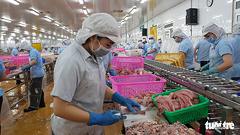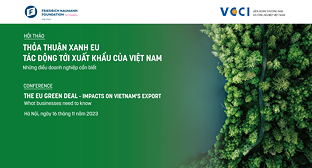Vietnam sees surge in fish, rice orders from Europe
26/09/2022 01:41

Rice and fish exporters across Vietnam’s Mekong Delta are ramping up production in order to meet the demands of European partners, particularly those from the UK.
The influx of orders from Europe is the result of a disruption in Russia’s seafood supply, as well as record inflation in European countries which has severely limited their consumption of high priced food productions.
Fish orders on the rise
Tran Van Lat, a representative of Loc Kim Chi Seafood JSC in Vinh Long Province, said that the company exports a whopping 200-240 metric tons of tra fish (pangasius) fillets to the UK each month, but expected orders to continue rising in the near future.
“The company currently exports tra fish to the UK at US$2.8-2.85 per kilogram,” Lat said.
Similarly, a representative of a leading tra fish exporter in Vietnam said that the UK is a loyal buyer of Vietnamese tra fish, so the increase in tra fish exports is not a major surprise.
“However, we are surprised at the large export volume in August, which was four to five times higher than that in previous months and years.
"In September, we will continue exporting such large volumes of tra fish and will devote all resources to these orders.”
The company has been exporting tra fish to the UK for more than four months in addition to the orders it fulfills for clients from Germany, France, and Canada.
Lat hopes that demand for white fish, tra fish, and basa fish will continue to rise so that exporters like Loc Kim Chi Seafood can move their business away from China, where heavy obstacles made doing business extremely difficult.
Currently, Loc Kim Chi Seafood exports between 200 and 250 metric tons per day.
A representative of Vinh Hoan Corporation in Dong Thap Province said tra fish exports to the UK and other European countries have skyrocketed since the same period last year.
Until the end of the year, tra fish exports are forecast to continue their upward rise.
“Vietnam tra fish exports will increase sharply during the third and fourth quarters while other countries prepare for their holiday seasons.
“We are confident that we can meet export demands until the end of the year,” the Vinh Hoan representative noted.
According to Le Chi Binh, vice chairman of the An Giang Fisheries Association, the UK had previously bought Vietnam’s tra fish through a middleman based in a third country.
However, thanks to the good relationship between Vietnam and the UK, enterprises from the UK are now buying tra fish directly from Vietnam.
As a result, the volume of tra fish exports the UK has increased.
“Vietnam used to sell tra fish through a middleman because local enterprises did not directly promote the product in the UK. The middleman used to purchase our tra fish, put on a new label, and ship the product to the UK,” Binh explained.
Duong Nghia Quoc, chairman of the Vietnam Pangasius Association, told Tuoi Tre (Youth) newspaper that over the past few weeks, the UK and other European markets have increased their imports of Vietnam’s tra fish.
In addition to residents’ demand for food products at reasonable prices amid high inflation, the disruption of Russia’s white fish supply has also caused the growth of Vietnam’s tra fish exports.
According to the Vietnam Association of Seafood Exporters and Producers (VASEP), Vietnam’s tra fish exports to the UK last month tripled compared to the same period last year.
Quoc added that Europe is a selective market and many agricultural products, including tra fish, have been in that market for a long time, but exports are still surging due to rising demand.
As a result, enterprises should ensure stable resources, deliver products on time, and ensure the quality.
“The UK and Europe as a whole are in dire need of white fish, and Vietnam is doing well with exporting seafood to the market.
“Insiders forecast that seafood exports to the UK and Europe will continue increasing until the end of the year,” Quoc noted.
According to seafood experts, the European Union–Vietnam Free Trade Agreement (EVFTA), which took effect in August 2020, has brought multiple incentives to producers, improved the competitiveness of Vietnamese seafood, and opened up opportunities for Vietnamese enterprises to directly export products to the European market.
Exchange rates raise concern
Phan Hoang Duy, deputy director of Can Tho Export Import Seafood JSC, said that the UK and Europe as a whole have a higher demand for seafood from Vietnam, especially tra fish and shrimp, compared to the past.
However, as the euro is weaker than the U.S. dollar, people in the European Union have to pay more to buy tra fish and shrimp.
“This is a major hindrance to the exports of shrimp and fish to the market. Except for this particular issue, Vietnam’s export of seafood to Europe is favorable,” Duy affirmed.
Can Tho Import Export Seafood JSC exports its products to more than 30 countries, mainly large markets such as the U.S., Europe, Mexico, Canada, Brazil, as well as some Asian markets.
Until the end of 2022, exports to the U.S. and other markets will not increase sharply, so the company is relying on exports of tra fish and other seafood products to Europe to continue their growth, Duy added.
FTAs pave the way for rice exports
Besides seafood, Vietnamese rice is a major export to the UK.
A representative of Loc Troi Group said that, the in the past, the UK only imported a small volume of rice from Loc Troi.
Now, however, Loc Troi will export more than 6,000 metric tons of rice to the UK in just October.
“We used to only export 200 to 300 metric tons of rice to the UK each month,” the Loc Troi representative said.
The UK demand for Loc Troi rice rose strongly once word spread that it met European standards.
Vietnamese rice is exported to the UK at $600 to $800 per metric ton.
There are many reasons for the increase in rice exports to the UK, including the UK-Vietnam Free Trade Agreement and other free trade agreements (FTAs).
Thanks to these FTAs, Vietnamese products, including rice, are entitled to tax exemptions and reductions upon being exported to the UK.
Furthermore, tax reductions have attracted UK attention to Vietnam’s rice quality.
“Loc Troi’s rice exports to the UK used to be subject to a tax of $175 per metric ton, but that tax has been removed. Now, the UK wants to import more Loc Troi rice thanks these tax reductions.
“Moreover, Europe and the UK found that Vietnamese rice meets their standards,” the Loc Troi representative explained.
However, the UK and Europe have only allowed some, not all, Vietnamese enterprises to ship rice to their markets.
To export rice to the UK, Vietnamese firms are required to have the Sedex Members Ethical Trade Audit (SMETA), in addition to a certificate stating it meets global standards.
In particular, rice must satisfy three criteria: product-market fit, being managed with a high-quality certificate system, and ensuring food safety with permitted pesticide residue levels.
SMETA is the most widely used social audit and the highest level of ethical assessment in Europe. Loc Troi has been a member of SMETA for two years.
Deals for rice exports to high-end markets are often concluded before farming, which is contrary to Vietnamese farmers’ habit of finding buyers after harvesting rice, the Loc Troi representative said.
Two years ago, Loc Troi established criteria and cut deals with farmers on appropriate products for importers before drawing up cultivation plans.
Source: Tuổi Trẻ News
Các tin khác
- Textile and garment exports recovered positively (19/04/2024)
- Foreign steel imported en masse, manufacturers call for protection (19/04/2024)
- US targets Chinese steel with 'overcapacity' fallacy amid escalating trade tensions; move casts great uncertainty on stabilizing bilateral ties (19/04/2024)
- Thailand is considering implementing protective tariffs on imports from China (19/04/2024)
- Fruit and vegetable exports to RoK and Thailand surge (19/04/2024)
 Home
Home
 About Us
About Us




















